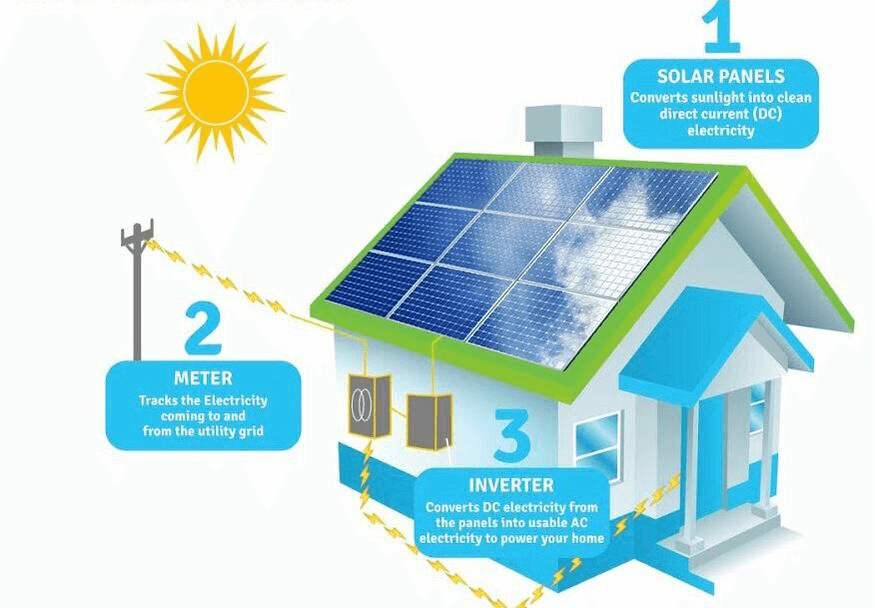The Future of Power: How Solar Energy Is Forming Tomorrow'S World
As the worldwide power landscape progresses, solar power emerges as a pivotal force driving this change. Recent developments in solar innovation and energy storage are enhancing the efficiency and availability of solar power, triggering a shift towards sustainable practices throughout numerous markets.
The Increase of Solar Innovation
The increase of solar technology has noted a substantial shift in the global power landscape, driven by innovations in photovoltaic systems and power storage space services. As the push for sustainable power sources heightens, solar power has emerged as a leading challenger as a result of its fundamental advantages, consisting of abundance, accessibility, and marginal ecological impact.
Recent innovations in photovoltaic panel effectiveness, such as the development of bifacial panels and perovskite products, have dramatically boosted energy capture and conversion rates. These advancements permit solar setups to generate even more electrical energy from the exact same quantity of sunlight, enhancing their feasibility as a primary energy resource. Furthermore, improvements in power storage innovations, such as lithium-ion batteries, have actually addressed the intermittency obstacles connected with solar energy, enabling far better integration into power grids and giving reputable power also during non-sunny durations.
Moreover, the reducing price of solar innovation has actually made it increasingly easily accessible to both residential and commercial markets - Simply Solar Illinois. Federal governments and organizations worldwide are buying solar framework, recognizing its potential to add to power independence and carbon decrease goals. This momentum suggests that solar modern technology will continue to play an essential duty fit the future of energy
Economic Influence of Solar Energy
With the enhancing fostering of solar power, substantial economic advantages are becoming obvious throughout various markets. The solar sector has become a significant contributor to task creation, with countless settings created in production, installation, and upkeep. These tasks often provide affordable incomes, fostering neighborhood economies and minimizing joblessness prices.
Additionally, solar energy can result in reduced power expenses for customers and organizations alike. Simply Solar Illinois. By using sunshine, homes and enterprises can decrease their dependence on nonrenewable fuel sources, ultimately lowering energy bills. This cost-effectiveness is particularly beneficial for low-income family members, who might or else deal with energy destitution
Along with direct financial savings, solar power stimulates financial investments in facilities and technology. Federal governments and private entities are significantly moneying solar jobs, driving innovation and improving energy protection. This shift not just diversifies power portfolios but additionally draws in international investments, strengthening national economic situations.

Ecological Benefits of Solar Power
A growing body of proof highlights the significant ecological benefits of solar power, placing it as a crucial part in combating environment adjustment. Solar power production considerably decreases greenhouse gas exhausts compared to nonrenewable fuel sources. By taking advantage of sunlight, solar panels produce power without releasing co2 or other unsafe pollutants, contributing to cleaner air and a much healthier atmosphere.


The lifecycle of solar panels additionally demonstrates ecological advantages; they are progressively designed for recyclability, decreasing waste and promoting a round economic climate. By spending in solar power, areas can decrease their eco-friendly footprint while promoting lasting practices. Generally, the change to solar energy not only addresses energy needs however also plays an essential role in promoting ecological stewardship and strength versus environment change.
Solar Power in Everyday Life
As solar energy technology ends up being significantly accessible, a lot more houses and businesses are integrating it into their everyday procedures, transforming how energy is taken in. This assimilation is evident in the growing number of household solar panel installations, which allow home owners to generate their own electrical power, decrease utility expenses, and add to ecological sustainability.
In commercial setups, organizations are taking advantage of solar power to power operations, frequently profiting from government incentives and tax obligation credit ratings designed to advertise sustainable energy fostering. This shift not just lowers operational costs yet also boosts company social duty by lowering carbon impacts.
Solar energy is additionally affecting product development, with solar-powered appliances and devices gaining appeal. Simply Solar Illinois. Things such as solar chargers for electronics, outdoor lighting remedies, and also solar-powered automobiles are ending up being commonplace, showing the adaptability of solar innovation in everyday life
Additionally, neighborhood solar tasks are arising, enabling individuals to share solar power sources, consequently making it available to those who might not have appropriate conditions for installment. Generally, solar energy is improving day-to-day power consumption behaviors, leading the means for an extra sustainable and energy-efficient future.
Future Fads in Solar Power

Furthermore, the integration of power storage space services, such as sophisticated batteries, is set to enhance the reliability of solar energy. By keeping excess power created during peak sunshine hours, homes and companies can utilize solar energy also when the sun is not shining, properly alleviating one of the major disadvantages of solar technology.
Moreover, the rise of clever grids and the Web of Things (IoT) will certainly help with real-time power administration, maximizing energy intake and distribution. This interconnected approach will encourage customers to check their power usage and optimize their reliance on solar energy.
Conclusion
To conclude, the transformative potential of solar energy appears in its capability to reshape power systems, drive economic growth, and check this advertise environmental sustainability. As improvements in technology remain to boost effectiveness and access, solar power stands positioned to play a critical duty in achieving a carbon-neutral future. The combination of clever grids and innovative energy options will certainly further make sure reliable energy management, solidifying solar energy's placement as a cornerstone of contemporary power framework.